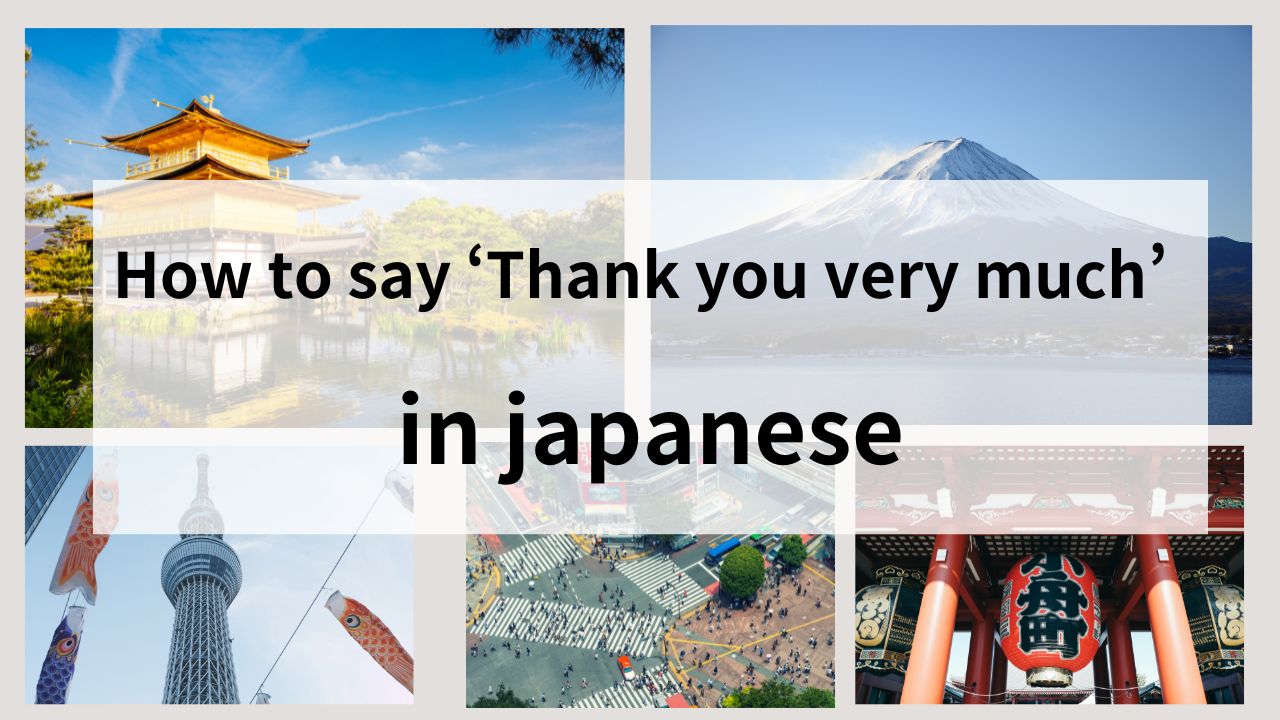Are you curious about how to say “thank you very much” in Japanese? Expressing gratitude is an essential part of Japanese culture, and the way it’s done can convey various levels of appreciation and formality. This guide will explore the Japanese phrase for “thank you very much,” its cultural significance, and practical applications.
How Do You Say “Thank You Very Much” in Japanese?
The Japanese phrase for “thank you very much” is ありがとうございます (arigatou gozaimasu). This expression is widely used in both casual and formal contexts, demonstrating respect and gratitude towards the recipient.
The Japanese Phrase for Thank You Very Much: Arigatou Gozaimasu (ありがとうございます)
“Arigatou gozaimasu” is a polite way to express thanks and is appropriate for most situations. Here are a few contexts in which you might use this phrase:
- Receiving a gift: When someone gives you a present.
- After a meal: Thanking the chef or host for the delicious food.
- In customer service: Expressing gratitude to staff for their assistance.
The Kanji and Meaning Behind “Arigatou”
The term “arigatou” (ありがとう) comes from the kanji 有難う, which literally means “rare” or “difficult to obtain.” This reflects the deep appreciation the Japanese have for receiving something valuable or rare from someone else. The primary reading for the kanji is あり (ari) meaning “to exist,” and 難う (gatai) meaning “difficult.” Together, they convey a sense of thankfulness for the effort or kindness shown by others.
Does “Thank You Very Much” Work in Japanese?
The English phrase “thank you very much” does have an equivalent in Japanese, and “arigatou gozaimasu” is generally understood by Japanese speakers of all ages. However, it’s essential to note that using the appropriate level of politeness in different contexts is crucial in Japanese culture. On a 5-point scale, the comprehension of this phrase rates as:
- Rating: 5 – Universally understood (over 90% of people)
For informal situations, you might simply say ありがとう (arigatou). However, for most interactions, especially when showing respect, using “arigatou gozaimasu” is recommended.
The Cultural Significance of Expressing Gratitude in Japan
Gratitude holds a significant place in Japanese culture, reflecting the values of respect, humility, and community. Expressing thanks is not merely a polite gesture but an essential part of maintaining harmony in relationships.
Gratitude as a Social Norm
In Japan, saying “thank you” is deeply ingrained in social interactions. Whether in personal relationships, business settings, or service encounters, expressing gratitude fosters goodwill and strengthens bonds.
The Role of Humility in Expressions of Thanks
Japanese culture places great importance on humility. When expressing gratitude, it is customary to acknowledge the effort or kindness of others, often downplaying one’s own contribution. This cultural nuance enhances the sincerity of the expression.
Practical Applications of “Thank You Very Much” in Japanese
Understanding how to use “thank you very much” in Japanese can enhance your interactions and help you navigate various social situations. Here are some practical applications:
Using “Arigatou Gozaimasu” in Daily Conversation
Here are a couple of examples of how to incorporate “arigatou gozaimasu” into daily conversations:
- 食事をありがとうございました (Shokuji o arigatou gozaimashita): “Thank you for the meal.”
- 手伝ってくれてありがとうございます (Tetsudatte kurete arigatou gozaimasu): “Thank you very much for helping me.”
Expressions Related to Gratitude
In addition to “arigatou gozaimasu,” there are several other expressions that convey gratitude or appreciation in Japanese:
- 感謝します (Kansha shimasu): “I appreciate it.” This phrase is more formal and used in written communication or serious situations.
- どうも (Doumo): A casual way to say “thanks,” often used among friends or in informal settings.
FAQs
Here are some frequently asked questions about expressing gratitude in Japanese.
Is “Thank You Very Much” Common in Japan?
Yes, “arigatou gozaimasu” is a common phrase used in Japan, reflecting the cultural importance of expressing gratitude in various situations.
How Do You Write “Thank You” in Japanese?
The phrase “thank you” can be written in different scripts in Japanese. Here’s a breakdown:
- Hiragana (ありがとう, Arigatou): Used in casual writing and conversation.
- Katakana (アリガトウ, Arigatou): Rarely used, but may appear in advertisements or stylistic contexts.
- Kanji (有難う, Arigatou): The most formal way to write “thank you,” often seen in literature and formal settings.
Choosing the appropriate script depends on the context and audience. Understanding these variations can enhance your communication skills in Japanese.
Conclusion
“Thank you very much,” or “arigatou gozaimasu” in Japanese, is more than just a polite expression—it’s a reflection of cultural values, social norms, and the importance of gratitude in everyday life. By understanding its usage and significance, you can deepen your appreciation for this essential aspect of Japanese culture.








